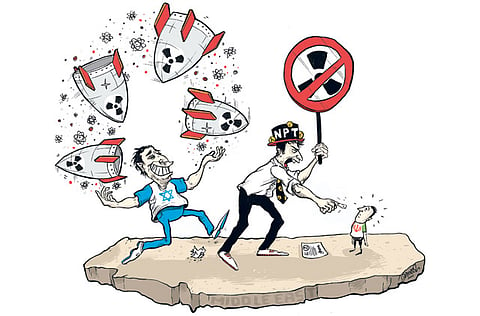Non-proliferation efforts marred by double standards
The NPT review meet has had some success, but it is likely to remain seriously flawed unless it produces concrete results

The last few weeks, Israel and Iran dominated high-level, intense diplomatic activities in New York and Washington. The UN Nuclear Non-Proliferation Treaty (NPT) review conference ended with a declaration in which 189 countries reaffirmed their commitment to eliminating all nuclear weapons.
However, this is once again more of a rhetorical commitment than a roadmap of concrete and practical steps of how to achieve the goal of eliminating all nuclear weapons. Moreover, the nuclear weapons states successfully opposed the imposition of a deadline for achieving total nuclear disarmament. They also refused any reference to any legally binding commitment on not using nuclear weapons against non-nuclear weapons states. The major achievements of the conference seem to be the setting for the first time of a deadline (2012) for the holding of a conference to discuss the proposal of making the Middle East a nuclear weapons-free zone.
Another novelty is the call to Israel, Pakistan and India to join the treaty — an unlikely prospect if membership of the treaty entails their renouncing their nuclear status. On the other hand, the nuclear weapons states successfully strengthened the language imposing an obligation on the non-nuclear weapons states to keep their nuclear programmes open to international inspection and to suffer the consequences if they failed to do so — a development likely to affect the current standoff between the West and Iran over the latter's nuclear programme.
In short, if in 40 years these are the major accomplishments of the NPT, then it is fair to say that the major goal of total nuclear disarmament and the novel goal of making the Middle East a nuclear weapons-free zone will remain distant prospects.
Parallel to the negotiations at the NPT review conference in New York, a set of other negotiations was quietly but dramatically challenging the balance of power in place since 1945. Two emerging powers — Brazil and Turkey were successfully negotiating a new nuclear agreement with Iran to end the standoff between the West and Iran over the latter's nuclear programme. The agreement is basically a new version of the agreement Iran had reached with the West last year, but was never implemented; that is to say Iran agreed to stockpile its low-enriched uranium abroad (in this case in Turkey) in return for specially packed fuel for its medical reactors. Further, the Brazil-Turkey sponsored agreement acknowledges Iran's right to enrich uranium while committing Iran to accepting regular inspections of its nuclear programme.
But perhaps the most remarkable aspect of the successful Brazilian-Turkish initiative is that it was carried out in spite of the intriguing absence of support from Washington and the European Union. It is fair to ask why Washington reacted patronisingly to the Brazilian-Turkish initiative and why the failure to embrace the Iranian concession and, instead, press ahead with sanctions.
US Secretary of State Hillary Clinton stated that Washington was pressing ahead with sanctions and explained that the timing of the sanctions was Washington's response to the Iran-Brazil-Turkey agreement: "This announcement is as convincing an answer," she declared, "to the efforts undertaken in Tehran over the last few days as any we could provide." This tough position is likely the result of pressure from Israel and seems eerily reminiscent of the propaganda campaign designed to prepare public opinion for the war against Iraq.
Even the corporate media's contributions to the propaganda campaign, including the dissemination of disinformation about the alleged existence in Iraq of weapons of mass destruction, finds parallels in the present standoff between Iran and Washington. Both the Washington Post and The New York Times belittled the value of the Brazilian-Turkish initiative and applauded Washington's tough position.
An editorial in The New York Times dismissed the Iranian concession and questioned the value of the agreement: "Brazil and Turkey … are eager to avoid a conflict with Iran. We respect those desires. But like pretty much everyone else, they got played by Tehran." Yet another piece of evidence of Israel's possession of nuclear weapons recently came to the fore. British newspaper The Guardian revealed the existence of secret South African documents revealing that Israel offered to sell nuclear weapons to apartheid South Africa.
The picture that emerges is still one of double standards — a perennial complaint addressed to the nuclear weapons states. On the one hand, Israel is unquestionably a nuclear power and remains so for the foreseeable future beyond the accountability of the NPT. On the other hand, Iran is a signatory to the NPT and has just provided evidence of readiness for cooperation, but continues to be the object of unnecessarily tough treatment. The NPT review conference may have achieved some success, especially by comparison to the disarray that characterised the previous review conference, but it is likely to remain seriously flawed unless it produces concrete results and remedies the issue of double standards.
Adel Safty is Distinguished Professor Adjunct at the Siberian Academy of Public Administration, Russia. His new book, Might Over Right, is endorsed by Noam Chomsky, and published in England by Garnet, 2009.
Sign up for the Daily Briefing
Get the latest news and updates straight to your inbox



